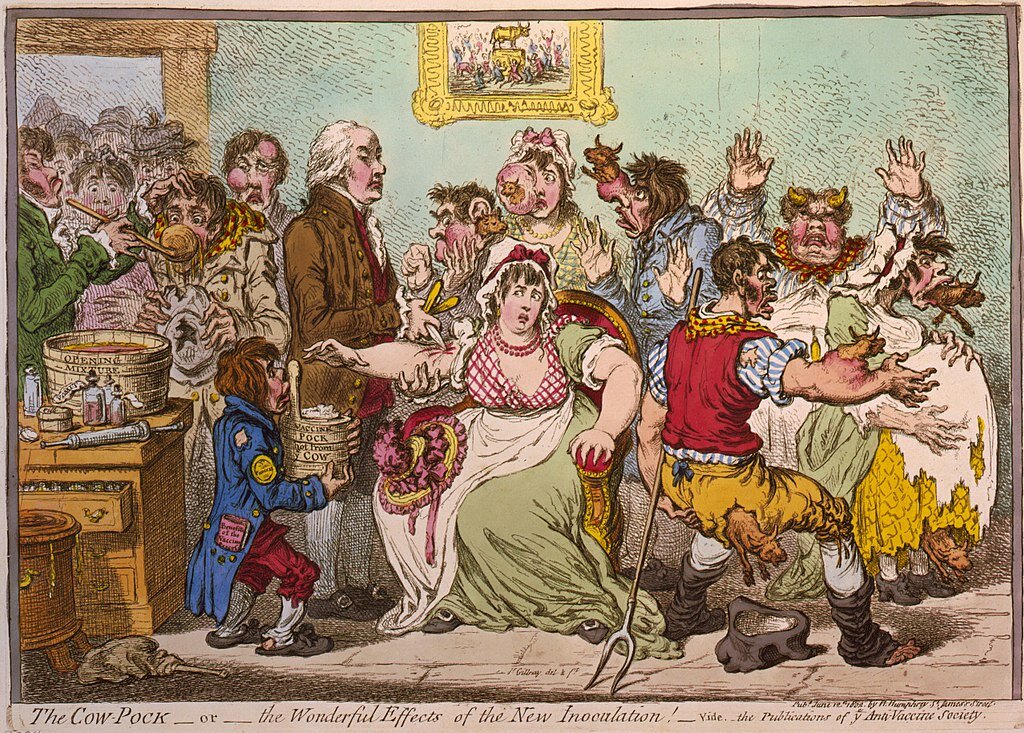16 December 2020
The word vaccine comes to us from the Latin vacca, meaning cow. That may seem a bit odd until one considers the history of this particular aspect of medical science. Smallpox is caused by Orthopoxvirus variola, and its cousin in the Orthopoxvirus genus causes cowpox, a disease that is far less virulent in humans. In the late eighteenth century, people began to observe that those who had been infected with cowpox seemed to be immune to smallpox.
Acting on this observation, English physician Edward Jenner began experiments to inoculate people with the cowpox virus and discovered that this was an effective preventative for smallpox. Jenner dubbed the causative agent for cowpox variolae vaccinae (pox of the cow) and used the adjective vaccine to refer to things associated with cowpox. From a 1799 discussion by Jenner of his discovery:
From communications, with which I have been favoured from Dr. Pearson, who has occasionally reported to me the result of his private practice with the vaccine virus in London, and from Dr. Woodville, who has also favoured me with an account of his more extensive inoculation with the same virus at the Small Pox Hospital, it appears that many of their patients have been affected with eruptions, and that these eruptions have maturated in a manner very similar to the variolous.
Jenner’s use of virus here refers to the pus from a cowpox pustule, which is what he used to inoculate his subjects, as what we today call viruses would not be discovered for another century. In Latin, virus means venom and can refer to any toxic substance.
The noun vaccination to denote inoculation with cowpox appears in the title of an 1800 paper by physician Richard Dunning: “Some Observations on Vaccination, or the Inoculated Cow-Pox.”
Later in the nineteenth century vaccine began to be used as a noun and in reference to inoculations for diseases other than smallpox/cowpox. For instance, here is a 1 April 1886 article in the anti-vivisection journal The Zoophilist in reference to Louis Pasteur’s vaccine for rabies, or as it was known then, hydrophobia:
On the 6th of July last, M. Pasteur performed his first inoculation on a human being with the so-called vaccine of hydrophobia. Joseph Meister, his first subject, had been bitten two days before by a dog supposed to be mad.
Curiously, over the centuries since Jenner first began to inoculate people against smallpox, the virus in the smallpox vaccine mutated, and while it has remained an effective prophylaxis for smallpox, it is no longer the causative agent for cowpox. As a result, the virus in the vaccine kept the name Orthopoxvirus vaccinia, while the name of the virus that causes cowpox is now Orthopoxvirus cowpox virus.
The World Health Organization (WHO) declared in May 1980 that smallpox, Orthopoxvirus variola, had been eradicated, but we continue to use vaccines for any number of diseases,
Sources:
Jenner, Edward. Further Observations on the Variolae Vaccinae or Cow Pox. London: Sampson Low, 1799, 56. HathiTrust Digital Archive.
Oxford English Dictionary, second edition, 1989, s.v. vaccine, adj., vaccine, n., vaccination, n.
“The Pasteur Craze.” The Zoophilist, 5.12, 1 April 1886. HathiTrust Digital Archive.
Image credit: James Gillray, 1802, Library of Congress, Prints & Photographs Division, LC-USZC4-3147.

